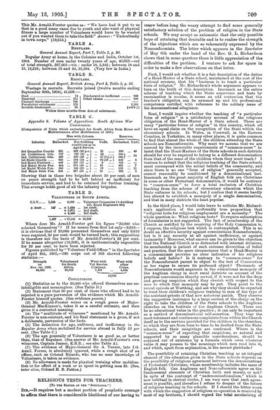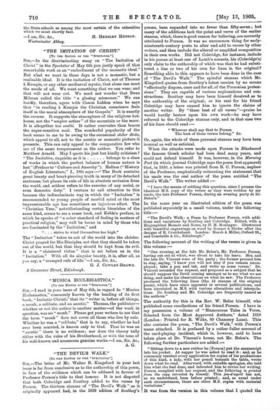RELIGIOUS TESTS FOR TEACHERS.
[To MB EDITOR OP Tan SPIPCPATOR."] • SIB,—It requires but a modest portion of prophetic courage to affirm that there is considerable likelihood of our having to
renew before long the weary attempt to find some generally satisfactory solution of the problem of religion in the State schools. We may accept as axiomatic that the only possible hope of attaining that desirable end is to realise the strength of the objections which are so vehemently expressed by the Nonconformists. The letter which appears in the Spectator of May 6th under the hand of the Rev. G. L. Richardson shows that in some quarters there is little appreciation of the difficulties of the problem. I venture to ask for space in order to make a few observations on that letter.
First, I would ask whether it is a fair description of the duties of a Head-Master of a State school, maintained at the cost of the national revenue, that his "business is to teach a particular form of religion." Mr. Richardson's whole argument appears to turn on the truth of this description. Inasmuch as the entire scheme of teaching which the State supervises and tests by examination is secular, it seems an odd contention that the teacher's obligation can be summed up and his professional competence certified with reference to the solitary issue of his denominational allegiance.
Next, I would inquire whether the teaching of "a particular form of religion" is a satisfactory account of the religious obligation of the Head-Master of a State school. There are many "particular forms of religion" in this country, whioh all have an equal claim on the recognition of the State within the elementary schools. In Wales, in Cornwall, in the Eastern Counties, in Yorkshire, in many other places, it is quite common to find that almost the whole of the children attending the State schools are Nonconformists. Why must we assume that we are coerced by the inexorable requirements of " common-sense " to insist that the Head-Masters of the State schools in such districts should for ever be required to belong to a different denomination from that of the mass of the children whom they must teach ? I venture to submit that the religious teaching of the State schools must correspond with the actual beliefs of the community, and since there is no one "form of religion" generally accepted, cannot reasonably be conditioned by a denominational test. Inasmuch as the great majority of English folk are Christians in some or other Protestant denomination, it would be contrary to " common-sense " to force a total exclusion of Christian teaching from the scheme of elementary education which the State enforces in its schools; but I confess that it seems hardly less absurd to establish a monopoly of a single denomination, and that in many districts the least popular.
In the third place, I would take leave to criticise Mr Richard- son's application of the profoundly true proposition that "religious tests for religious employment are a necessity." The whole question is: What religious tests P To require subscription of formularies is not suggested. The fact of membership of the Church as certified by the receiving of the Holy Communion is, I suppose, the religious test which is contemplated. This is no doubt an effective security against conscientious Nonconformists, but is it any security at all against inefficiency, or against insincerity? Moreover, what answer can be given to the objection that the National Church is so distracted with internal divisions, its membership is patient of such extreme diversities of belief and practice, that the mere circumstance that a Head-Master is a communicant provides no clear indication of his religious beliefs and habits ? Is it contrary to " common-sense " for the Nonconformist parent to object to the test of Communion as too vague to secure its professed object ? Thousands of Nonconformists would acquiesce in the educational monopoly of the Anglican clergy in most rural districts on account of the practical conveniences thereby served, if it were not for the deep and growing suspicion which they cherish with respect to the uses to which that monopoly may be put. They point to the recent episode at Worthing, and ask why they should be expected to trust their children's religious training to men of the type of the assistant-priests of that now notorious parish. They observe the suggestive insistence by a large section of the clergy on the right to take the children of the State schools to the Anglican churches on the festivals of the Anglican Church. There can be no educational value in the practice ; it can only be important as a method of denominational self-assertion. They hear the most vehement and continuous complaints from within the Church itself as to the services provided for the children in the churches, to which they are from time to time to be drafted from the State schools, and their misgivings are confirmed. Where is the "common-sense" of expecting that suspicions, so natural and supported by so many plausible considerations, should be conjured out of existence by a formula which owes whatever value it may possess to the meanings which men read into it, and which, apart from explanation, is the merest platitude ?
The possibility of retaining Christian teaching as an integral element of the education given in the State schools depends on the possibility of religious agreement between the denominations of Protestant Christians, whose membership includes the mass of English folk. Can Anglicans and Nonconformists agree on the fundamental elements of Christian faith and morals, or not? In spite of the contempt of "undenominationalism," which is now habitual in clerical circles, I am very sure that such agree- ment is possible, and therefore I refuse to despair of the future of religious teaching in the schools. If I shared the bitter scorn with which the suggestion of religious co-operation is received by most of my brethren, I should regard the total secularising of
the State schools as among the most certain of the calamities which we must shortly face.
Weetminster Abbey.







































 Previous page
Previous page